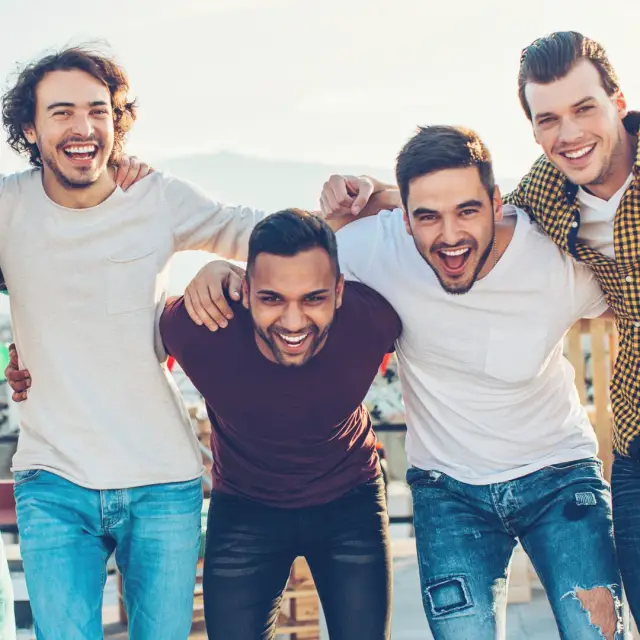Men's Day, celebrated on March 19 in Colombia, is a date that often goes unnoticed compared to other commemorative days such as Women's Day. However, its importance lies in recognizing and honoring men in their multiple roles within society.
Origins of Men's Day
The choice of March 19 for Men's Day in Colombia is no coincidence. This date coincides with Saint Joseph's Day, a religious holiday in honor of Saint Joseph, husband of the Virgin Mary and adoptive father of Jesus, who is venerated as the model of the just and protective man in Christianity. Although Men's Day has more religious roots in its origins, its meaning has evolved over time to encompass social and cultural aspects that highlight the importance of men in various fields.
Globally, there is a more recent celebration known as International Men's Day, which is commemorated on November 19 and aims to address men's health issues, promote positive male role models and encourage gender equality. However, in Colombia, March 19 remains the traditional date to celebrate men.
The Meaning of Men's Day in Colombia
Men's Day in Colombia has both a symbolic and practical character. It is an opportunity to reflect on the challenges and responsibilities that men face in modern society, as well as to highlight their achievements and contributions in the family, professional and community spheres.
Unlike Women's Day, which is usually full of discourse about rights, equality and the fight for equity, Men's Day in Colombia tends to have a more festive and relaxed approach. However, this does not diminish its importance. In a context where gender norms are constantly changing, this celebration can serve as a space to value the diversity of male experiences and promote a broader and more equitable vision of gender roles.
Celebrations in Colombia
The way Men's Day is celebrated in Colombia varies by region and local customs. In general, it is common for people to take advantage of the date to express their appreciation for the important men in their lives, such as fathers, brothers, husbands, friends and colleagues. Some of the most common forms of celebration include:
Gifts and Details: Many people choose to give men small gifts, such as chocolates, cards, clothing, accessories or items related to their hobbies and interests.
Family Gatherings: Like other celebrations, Men's Day is an opportunity to bring the family together and share special moments, whether with a meal, a barbecue or simply spending time together.
Activities at Work and School: In some work and educational settings, activities are organized to honor men, such as contests, games, and words of appreciation.
Religious Events: Given the link between this date and Saint Joseph's Day, some communities hold masses or religious events to highlight the values of the male figure in the Christian context.
Reflection on Gender Equality
Despite its festive nature, Men’s Day can also be an opportunity to address deeper issues related to gender equality and male well-being. In a society where traditional expectations about masculinity still persist, it is important to reflect on the challenges men face in terms of mental, emotional and physical health.
Men's Health
Men are often more reluctant to seek medical or psychological help, which can lead to higher rates of undiagnosed or untreated health problems. In this sense, Men's Day could serve as a reminder to encourage self-care and seeking support when needed.
Gender Roles and Stereotypes
Historically, men have been socialized to fulfill roles as providers, protectors, and authority figures, which often places them under significant pressure. In the current context, it is crucial to promote more inclusive models of masculinity that allow men to express their emotions, take on caring roles, and actively participate in building equitable relationships.
Violence and Toxic Masculinity
Violence and aggressive behaviour associated with toxic masculinity must also be addressed. Creating spaces for dialogue and education on these issues can contribute to building a safer and more respectful society for all.
Men's Day and Community Building
Beyond the individual aspects, Men's Day can also be an opportunity to strengthen community ties and promote values such as solidarity, respect and empathy. By recognizing and celebrating the contributions of men, it can also open the door to conversations about how to work together to build a more just and equitable society.
The Future of Men's Day in Colombia
As social and cultural norms evolve, the meaning and celebration of Men’s Day in Colombia could also change. It is possible that this date will take on a broader and more reflective focus, similar to International Men’s Day, addressing issues such as the health, rights and well-being of men in all aspects of their lives.
Furthermore, Men's Day could become a platform to promote gender equality, highlighting the importance of men and women working together to overcome inequalities and stereotypes that affect both genders.
Men's Day, celebrated on March 19 in Colombia, is much more than a time to give gifts or enjoy family time. It is an opportunity to reflect on the role of men in society, value their contributions and address the challenges they face. In a world that seeks to advance towards equity and inclusion, this celebration can be a starting point for broader and more meaningful conversations about gender, health and well-being.
By recognizing the diversity of male experiences and promoting positive role models, Men's Day can become a space to build a more equitable and respectful future for all.
